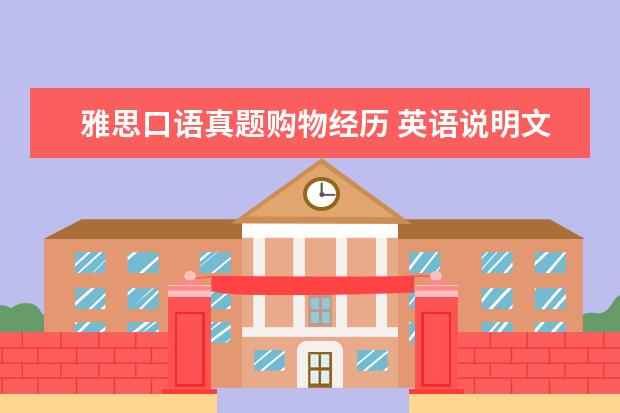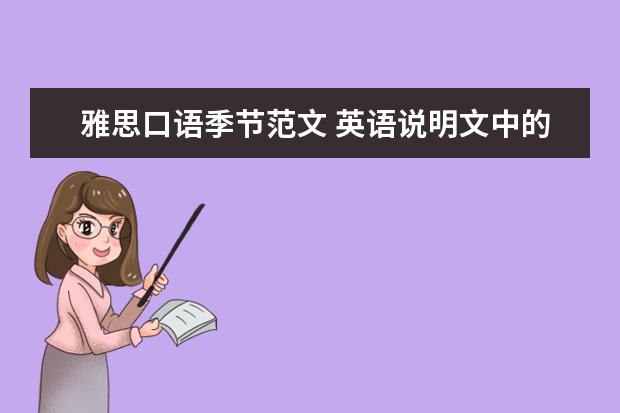雅思考试主要是通过对考生听、说、读、写四个方面英语能力的考核,综合测评考生的英语沟通运用能力,实现“沟通为本”的考试理念。对于雅思考生来说,也有很多考试难点和政策盲区需要帮助解答。今天雅思无忧网小编准备了文章雅思写作范文说明文教育问题,希望通过文章来解决雅思考生这方面的疑难问题,敬请关注。

在雅思写作的浩瀚宇宙中,说明文应该算是其中的重头戏,而且是十分难掌握的。下面就由上海为考生带来关于教育问题的雅思作文范文说明文。
一、教育问题
Do you agree or disagree with this statement? It is much easier to learn in a *all class than in a large one. Use specific examples and reasons to support your answer.
People’s views on the size of a class vary. While some people hold that a *all class is better for learning, there are others who argue that a big one is better. On a personal note, I am convinced that each size of classes has its merits and demerits and what really counts is the teacher. That is to say, if the teacher is good, then class sizes would be no big deal.
In the first place, both *all and big classes have their own advantages and disadvantages. Let’s take a *all class for example. With a *all number of students in one class, the classroom atmosphere would be relatively quiet and, therefore, it would be possible for students to concentrate on their learning. This can be easily understood, for, after all, the noise made by 10 or 20 people is much lower than that made by 100 or even 200 people! Also, with fewer students, the teacher would find it much easier to manipulate the class, that is, to have the whole class under complete control. If there are too many students, the teacher would be at a loss as to what to do in that controlling the situation itself would be challenging enough. Besides, in a *all class, the students could have more interactive activities with the teacher and the teacher can give each student whatever instructions or help that he or she needs. When the number of students in a class is much too big, one-to-one or one-to-several tutoring is simply impossible. However, this is not to say that a *all class is all good and a big one is all bad. In fact, as researches show, a *all class is more likely to give rise to tiredness and boredom, which hinders learning. In this respect, a big class prevails as it places higher pressure on the teacher, thus compelling him or her to be more energetic and more humorous so as to create a more lively learning atmosphere and, therefore, having the students’ attention. Who will benefit from all these? The students! Of course! Moreover, in a big class, the students could get to know more people, thereby making more friends as they have more choices. And making friends itself is meaningful in that it makes the class a more attractive place and in the long run, this makes for students’ learning.
In the second place, we must acknowledge the very fact that no matter how *all or big a class is, it is simply not that important as the teacher. Even in a class where there is only one student, if the teacher proves to be inefficient, not knowing how to teach at all, it would be impossible for the students to listen attentively, so there would be no way for them to really learn anything. Quite the opposite, if the teacher is good, then no matter how many students there are in one class, say, 1,000 of them, the teacher would still be able to teach enthusiastically and the students listen enjoyably, and the learning effect would be beyond any doubt. I had the experience of sitting in a 500-student classroom. The teacher was warmly received by the students and so we all learned happily. Moreover, just for the sake of securing a seat close to the teacher, many students would go to the classroom 1 hour earlier. This well confirmed the point that the teacher is what really counts.
From the above discussion, we can safely come to the conclusion that the size of a class does not have much influence on the students’ learning effect. What is really more crucial in this issue is the quality of the teacher.
看完这篇文章,相信考生已经大概有了一个写作文的模板,希望为你带来的雅思作文范文能为考生提供帮助。
以上就是雅思无忧网为您准备的雅思写作范文说明文教育问题访问雅思无忧网(https://www.yasi.cn/),了解更多雅思考试新消息,新动态。


 雅思写作说明文如何写
雅思写作说明文如何写
 雅思写作说明文怎么写?
雅思写作说明文怎么写?
 雅思写作说明文技巧
雅思写作说明文技巧
 雅思写作经典900句:说明文常用句式
雅思写作经典900句:说明文常用句式
 雅思写作方法有哪些——说明文
雅思写作方法有哪些——说明文
 雅思口语真题购物经历 英语说明文中的过程分析法有什么特点
雅思口语真题购物经历 英语说明文中的过程分析法有什么特点
 雅思口语流程英语说明文怎么写 请问雅思考试内容有些什么?
雅思口语流程英语说明文怎么写 请问雅思考试内容有些什么?
 雅思口语季节范文 英语说明文中的过程分析法有什么特点
雅思口语季节范文 英语说明文中的过程分析法有什么特点
 雅思口语高分范文 季节 英语说明文中的过程分析法有什么特点
雅思口语高分范文 季节 英语说明文中的过程分析法有什么特点
 合肥哪里雅思培训学校 英语说明文中的过程分析法有什么特点
合肥哪里雅思培训学校 英语说明文中的过程分析法有什么特点